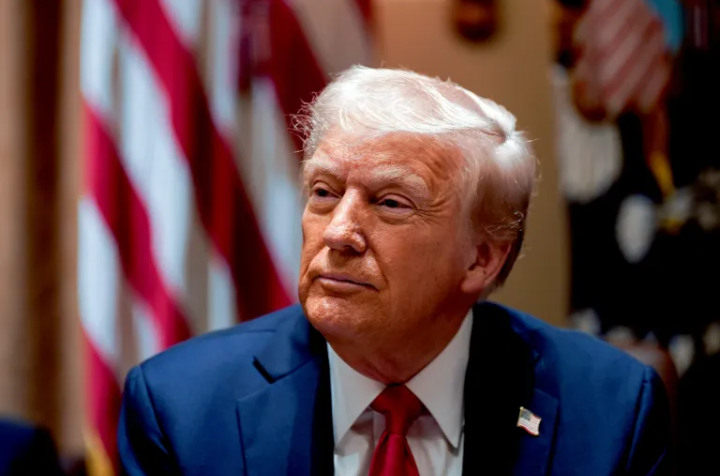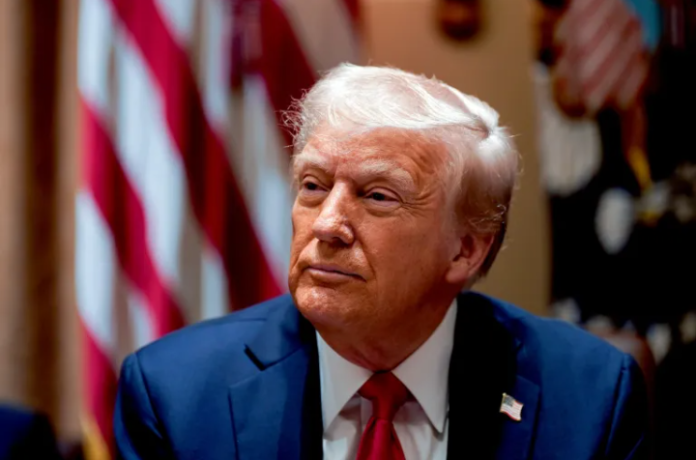In a dramatic shift in U.S. trade policy, President Donald Trump has turned his attention away from China and is now setting his sights on the European Union. Announcing a potential 25% tariff on EU imports—particularly targeting the automobile industry—Trump claims that Europe has long taken advantage of the United States.
This move could escalate trade tensions between the two economic powerhouses, potentially triggering retaliatory measures from the EU.
Trump’s Latest Trade War Strategy
Speaking at a cabinet meeting, Trump stated that European exports to the U.S. could soon face a significant tax increase. The primary targets? European cars and other key industries, alongside an existing hike on aluminum and steel imports. The announcement comes just after a visit from French President Emmanuel Macron, marking a stark departure from the usual diplomatic tone between the U.S. and its longtime ally.
This policy shift follows Trump’s relatively softened stance on China, despite previously imposing additional tariffs. While China and the U.S. have been in a long-standing trade battle, Trump appears eager to foster a more cooperative relationship with Beijing—contrasting sharply with his aggressive rhetoric towards Europe.
Why Is Trump Targeting the EU?
The U.S. and the EU have one of the world’s most significant trade relationships, with a total trade flow of $1.68 trillion in 2023. The EU maintains a trade surplus of approximately $50.3 billion, meaning it exports more goods to the U.S. than it imports. Trump argues that this imbalance is proof that the EU has been unfairly benefiting at America’s expense.
Despite his claim that he “loves the countries of Europe,” Trump accused the EU of being designed to “screw” the U.S. in trade agreements. This statement contradicts the historical purpose of the EU, which was initially formed after World War II to promote peace and economic stability in the region.
How Will This Impact Consumers?
If these tariffs go into effect, American consumers could face higher prices on everyday goods imported from Europe, including cars, electronics, and luxury goods. In 2022 alone, the U.S. imported over $553 billion worth of goods from the EU, making it one of its largest suppliers. Similarly, European companies that rely on U.S. customers might experience a decline in sales, potentially leading to job losses and economic instability.
For businesses, the effects could be even more severe. The U.S. and EU have invested heavily in each other’s markets—totaling nearly $5.55 trillion. Increased tariffs could discourage future investments and disrupt supply chains for industries that rely on transatlantic trade.
EU’s Response and Possible Retaliation
The European Union has already signaled that it will not accept these tariffs without a fight. Earlier this month, EU officials warned that they would take “firm and immediate” action if unjustified trade barriers were imposed. European leaders are likely to introduce countermeasures, targeting key American exports such as bourbon, denim, and motorcycles—items that have previously been used as leverage in trade disputes.
While Trump’s aggressive trade policies have sometimes been delayed or softened—such as in negotiations with Canada and Mexico—the EU appears prepared to push back harder than other nations. The coming months will determine whether this latest tariff threat will materialize into a full-scale trade war.
Trump’s Unexpected Praise for China

In a surprising turn, Trump has recently expressed a more favorable attitude toward China. Despite an ongoing tariff battle, he emphasized his strong relationship with Chinese President Xi Jinping, stating that he welcomes Chinese investments in the U.S. While he continues to enforce tariffs on Chinese goods, his recent comments suggest a willingness to negotiate.
Interestingly, Trump also refused to comment on Taiwan—one of the most sensitive geopolitical issues between the U.S. and China. Instead, he reiterated that he wants the U.S.-China relationship to remain positive, signaling a strategic shift in diplomatic priorities.
As the world watches this unfolding trade battle, one question remains: Will the EU stand its ground, or will negotiations lead to a last-minute resolution? Either way, global markets and consumers should brace for potential economic turbulence.



